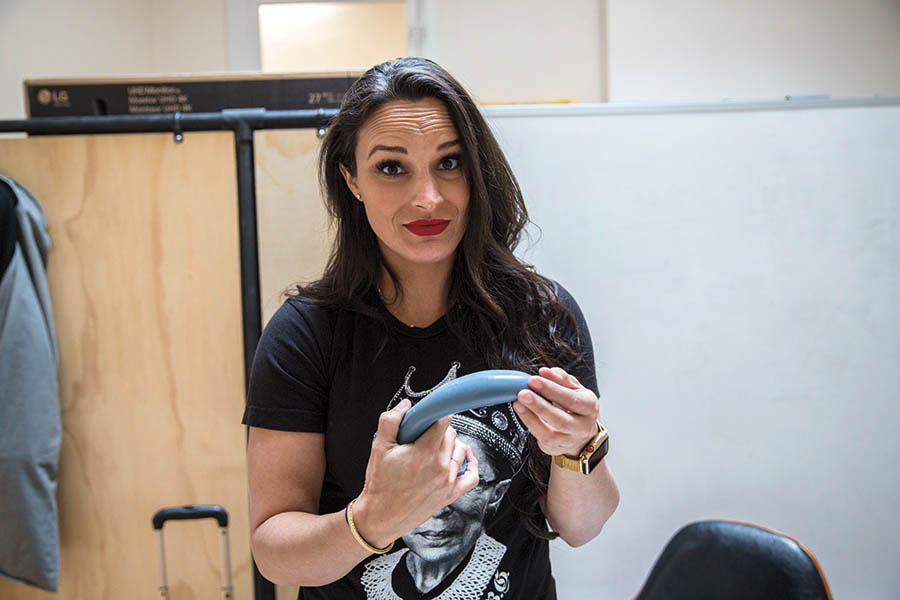Bend-based Lora DiCarlo promised to revolutionize the sex-toy industry with cutting-edge technology, feminist-friendly marketing and celebrity Cara Delevingne’s stamp of approval. In November the company abruptly shuttered. What happened?
In November of 2022, Thor Mikelic was working on social marketing and email campaigns for an upcoming promotion of Lora DiCarlo vibrators.
Co-owner of the Newburgh, New York-based sex-toy company SheVibe, Mikelic was excited about the collaboration. Mikelic’s buyer had even scheduled the promotion on SheVibe’s social apps. But by late November, there was no inventory left and the Lora DiCarlo website went offline.
“They just disappeared,” Mikelic says.
The sudden demise of Lora DiCarlo, the buzzy Oregon-based sex-tech startup founded by Lora Haddock, is still shrouded in mystery. Business colleagues like Mikelic think reckless spending may have had something to do with it; records obtained by Oregon Business paint a picture quite different from that of the progressive, feminist tech startup Lora DiCarlo touted in its marketing. The company has also faced criticisms of its product’s high price tag and a legal challenge to its claim of technological innovation. “Lora DiCarlo’s products were so overpriced and they were constantly raising money,” Mikelic says. “Something was wrong.”
Indeed, something was very wrong. Three civil rights complaints filed with Oregon’s Bureau of Labor and Industries (BOLI) allege serious improprieties including pervasive sexual harassment, a hostile work environment, sexism and retaliation. (Only one of these cases has been resolved; two are still under investigation.)
One complaint, made by CEO Lora Haddock’s former assistant, alleges that on their first business trip together, Haddock “forgot her pajamas” and slept naked in the same room as the assistant, later asking her to touch a mosquito bite on Haddock’s bare bottom. Two complaints allege that both Haddock and her chief operating officer (and then-boyfriend), Doug Layman, made frequent inappropriate sexual comments to their employees — including details about their own sex life. All three former employees — all of whom are women — allege that throughout their employment, male employees were treated better than female employees.
“It was so anti-woman,” says one of these former employees. “Doug constantly was abusive toward women. It sets a tone that you can’t speak up — you are at risk of being attacked, too. The CEO would just sit and cower to whatever Doug says. She didn’t defend anyone or help out in the way a CEO would. She was in charge, but in reality Doug was in charge.”
‘A Gold Brick’
Founded in 2017 by Haddock (who at some point changed her name to Lora Haddock DiCarlo) and her then-romantic partner, Douglas Layman, the company stumbled upon the kind of PR in January 2019 that publicists only dream about. The company won an innovation award for the Osé — its signature toy — at the annual Consumer Electronics Show in Las Vegas, only to be unceremoniously kicked out of the show for being “immoral, obscene, indecent, profane” and not in keeping with the show’s image. Their award was revoked.
Publicist Evie Smith Hatmaker, who had the company as a client at the time, remembers this moment fondly.
“I turned to Lora — she was really upset. And I was like, ‘A gold brick just landed on our laps,’” she recalls.
She was right. Haddock wrote an open letter on the Lora DiCarlo website accusing the Consumer Technology Association, which produces the trade show, of gender bias. She also penned an op-ed in The Washington Post. National outlets like The New York Times, Wired and TechCrunch wrote about how sexist and hypocritical it was to allow sex robots and VR porn for straight men into prior CES shows but not a vibrator focused on women’s pleasure. By May CES had offered an apology and restored the prize. When the company finally began taking presale orders for the Osé in late November of 2019, it brought in $1 million in the first five hours, Haddock told Wired. And that was before a prototype of the vibrator was even ready.
 A Lora DiCarlo mechanical design engineer displayed a 3D rendering of the Osé on screen in 2019. Photo by Jason E. Kaplan
A Lora DiCarlo mechanical design engineer displayed a 3D rendering of the Osé on screen in 2019. Photo by Jason E. Kaplan
The company, which developed the Osé with Oregon State University’s College of Engineering, spun a narrative of itself as a sex-positive company with a femtech pioneer at the helm. The Osé was also touted as a novel kind of sex toy, with air-pulse technology that stimulates the clitoris the way a mouth might, producing a so-called “blended orgasm.” In November 2020 it scored a coup, bringing on actress and model Cara Delevingne as co-owner and creative adviser.
‘Morally Bankrupt’
But underneath the hype were serious problems, according to several sources interviewed for this article. Haddock, whose tale of self-invention was told differently in every article, never went to med school, even for a semester (as she claimed on the Lora DiCarlo website and in several interviews, according to a 2020 feature in Wired). In a 2020 article for Men’s Health, she’s quoted as saying she’d been in medical school when she had her “holy grail of orgasms” that inspired her to found the company; The New York Times claimed she had served in the Navy. In a 2019 profile in this magazine, we said she’d studied nursing at Portland State University. (Portland State has no record of her ever being enrolled.) The civil rights complaints filed with BOLI allege that Lora DiCarlo was a hostile work environment where women’s views were not valued and where women (at least certain women) were subjected to inappropriate sexual comments, sexual harassment, retaliation based on pregnancy, and racism.
Haddock’s longtime phone number was no longer in service and emails to her company email bounced back. Calls and emails to her lawyer, Scott Oborne at Jackson Lewis P.C., were not returned.
Complaints against the company filed with BOLI allege harassment by both Layman and Haddock, as well as a pattern of racist and gender-based discrimination.
In her civil rights complaint former director of sales and marketing Sarah Brown alleges that “male employees were treated better, more favorably, while female employees were treated as if they were poor at their jobs.” Sherry Tran, who worked in customer service and market research, says in her civil rights complaint that Layman would attack female employees during meetings but not male employees. She also says he would fire female employees with little provocation or warning. Tran, whose complaint is still under investigation, alleges that she was subjected to a hostile work environment based on her race. (She is from Vietnam and identifies as Asian.) Tran also alleges that Haddock and Layman would make inappropriate sexual comments that made her so uncomfortable she would need to walk away from her computer during virtual meetings.
But the most damning charges were from Haddock’s former executive assistant. (OB was not able to reach this complainant; she is named in the complaint, but we are withholding her name due to the nature of the allegations.) In her civil rights complaint, this woman alleged pervasive sexual harassment by Haddock as well as open discrimination against her pregnancy from Haddock and Layman. In her complaint, which was resolved in her favor, she alleges that on their first business trip together, Haddock not only “slept naked in the same room as me, claiming that she forgot her pajamas,” but also that Haddock asked her to touch her bare bottom. She also alleged that multiple times Haddock freely shared details about her sex life with Layman. The complaint says Haddock told employees that she and Layman were part of a sex club in Portland, where they would not engage in sex acts but “will go around and watch other people.” Haddock told the assistant that while she was away on trips, she sent a female friend to Layman “as a present,” and that she is the dominant and Layman is the submissive and “he is ‘her bitch.’” Haddock also told her assistant that she could call Layman “Daddy,” according to the complaint.
The former assistant says that she could not report this to the company’s human resources department because it was run by a friend of Haddock’s. She asked Haddock about policies regarding reporting confidential matters and, this woman states in her complaint, Haddock said that everything should come directly to her because “human resources discloses everything to her anyway.”
In her written response to this BOLI investigation, Haddock denied that she sexually harassed her assistant, slept naked in the same room or asked her assistant to touch her bottom, but said, “The nature of the business also requires discussions related to sex or [that] are sexual in nature.” This former assistant provided multiple witnesses, texts, and emails, and after a thorough yearlong investigation, a BOLI civil rights investigator determined there was substantial evidence of unlawful employment practices including sexual harassment, retaliation for reporting discrimination, and aiding and abetting sexual harassment and retaliation. In March of 2022, Scott Hunt, the complainant’s lawyer, asked BOLI to withdraw the case so he could resolve the matter via private action.
A number of former employees also allege that — though she was the public face of the company in most media coverage — Haddock was not really running the show at Lora DiCarlo. Instead, they say, Doug Layman was really running the company.
Depending on who you ask, Layman was either the chief operating officer or chief financial officer of Lora DiCarlo, but he was most certainly an investor. Smith Hatmaker says that she heard he had a successful exit from a previous startup and used some of his investor contacts to help get initial funding for Lora DiCarlo.
“He would go into meetings with her to talk to VCs,” Smith Hatmaker says. On the Oregon State University Foundation website, Layman is listed as having been the president and co-founder of Kadix Systems, “a management consulting firm focused on the federal government.” (Kadix sold to Dynamics Research Corps for $42 million in 2008.) In Lora DiCarlo’s U.S. Securities and Exchange Commission filing, which is filed under Uccellini LLC, Layman is listed as an executive officer for the company. (Records on file with the Oregon Secretary of State’s office show Uccellini LLC, of which Layman was the principal officer, formally dissolved in June 2021, but filed for an authorization to conduct business — with Haddock listed as president — the same day. They also say Portland attorney Mary Hull, who had been listed as a registered agent with the company, resigned from that role on Dec. 8, 2022.)
Layman also did not respond to emails requesting an interview for this story.
Another former employee, who asked not to be named because she fears litigation, said about Layman, “He is Lora DiCarlo — he founded it. Doug was, on paper, never more than an advisor, but in the day-to-day, he was in every meeting. He hired and fired.”
Asked if Layman was in fact running the company, Kim Porter, former director of engineering at Lora DiCarlo from February 2019 to February 2021, says, “Doug had more of a business background than Lora. But was he running the company? I don’t know who was running it…. Neither one of them knew how to get products to market.”
A Glassdoor review from November 2020 headlined “Awful, Toxic Company” seems to sum things up accurately, according to four former staffers interviewed for this story.
“The company that I thought would be the most woke, value-aligned company I could work for turned out to be more unethical and morally bankrupt than I could even fathom…. Executive leadership is manipulative and abusive. Their products aren’t innovative like they claim. It’s not truly a woman-owned, woman-run company as an older cis white male calls all the shots. Lora is merely the face of a shady company heading for failure. Run, don’t walk, away.”
 Lora Haddock with a prototype of the Osé in 2019. Photo by Jason E. Kaplan
Lora Haddock with a prototype of the Osé in 2019. Photo by Jason E. Kaplan
The Osé also got some negative reviews, with sex-toy tester Jess Joho telling a Wired podcaster that using the Osé was “a nightmare.” In that same podcast, journalist Lux Alptraum said the Osé was “excruciatingly painful” to use.
Critics have also pointed out that other companies like Womanizer and Satisfyer used air pulse technology, but that their products listed for far less than the Osé, which cost $290.
The Breakdown
Many former employees contacted for this story refused to speak on the record, citing a nondisclosure agreement they had signed with the company. Several that did speak to us asked that we not use their names or any identifying characteristics for fear of litigation.
One former employee agreed to answer questions via email but refused to answer any that might reveal their identity — like what their role was or how long they worked for the company. When asked why, they said, “The board members/majority shareholders of any leftover assets are known to be litigious.”
For simplicity’s sake, let’s call this source Pat. At first, Pat wrote in an email to Oregon Business the workplace at Lora DiCarlo was energetic, positive and inclusive. “Over time it became evident that there were some fractures between executives.”
In early spring of 2022, several staffers suspected that something strange was afoot when Haddock stopped attending meetings. “But we carried on with preparing for the holiday season since it wasn’t too unusual that she would disappear for weeks at a time,” Pat wrote. On Oct. 16, everyone — including HR and other C-level executives — got a text message from Haddock saying that everyone’s “termination was immediate,” according to Pat.
Pat says that they are still owed unpaid wages. BOLI reports that seven former Lora DiCarlo employees have made unpaid-wage claims.
“Our termination letters indicated that we would have COBRA options. However, we all later found our health insurance had not been paid, and we not only lost COBRA options but owed medical bills for the month of October as if we were uninsured,” Pat wrote, adding that through the collective work of all the laid-off employees, they were able to negotiate a deal with their insurance brokers. “We were on our own, but that wasn’t new.”
According to Pat, Layman left the company in October 2021, leaving a substantial amount of debt. Operational costs also suddenly swelled.
“We found that manufacturers and third-party logistics had been cutting us deals and giving us leeway due to the relationships that were built with the previous COO, logistics and operations teams,” Pat wrote via email. “These same parties, however, would decline meetings and refuse to continue to operate under similar agreements when the two women heading our company were requesting them.”
Even after cutting operational costs by 65% and running with a leaner budget, Pat says, the company was not able to handle the increase in shipping and logistics costs. “We needed a substantial influx of cash to move product to the states, pay off manufacturer debt and fund the launch of new product lines.”
The other woman heading the company, of course, was actress and model Cara Delevingne (with 42 million Instagram followers), whom Haddock brought onboard to be Lora DiCarlo’s new co-owner and creative adviser in November 2020, according to an article in Fast Company. Delevingne’s duties, according to the piece, included “raising brand recognition through content development and marketing strategies, as well as working with the in-house engineering team on product development.”
Delevingne’s entry was in theory, a master stroke. Pat says that the Cosmopolitan cover story on Delevingne’s sex toys that ran in July/August 2021 led to a spike in sales of Lora DiCarlo vibrators. Pat also says that Delevingne made a financial investment in the company in exchange for shares. (The company’s SEC filing shows that $2 million worth of shares were sold on Nov. 10, 2020, though it doesn’t divulge who they were sold to.)
The company also faced litigation from a German company called Novoluto, which makes the Womanizer. The two companies continued to file motions in the case through 2022, but on Nov. 15, Steven Lovett and Nathan Brunette at Stoel Rives filed a motion to withdraw as Uccellini’s legal counsel. They followed that with a December request to extend deadlines in the case, saying the reasons for the withdrawal could not be disclosed in the public record, but also that “counsel has not received the needed instructions from Defendant regarding positions it wishes to take on the substance of this case.” On Jan. 17, Judge Mustafa Kasubhai granted that motion and vacated all filing deadlines until the company finds new legal representation.
At press time, the company had not declared bankruptcy. The sex-toy review site Bedbible has published an article advising customers who haven’t received their product yet to keep an eye on bankruptcy filings and to file a proof of claim to get a refund.
Sexual-wellness sales and marketing agency Gisele International terminated its partnership with Lora DiCarlo on Oct. 17, 2022. “After weeks of being silent on us, canceling meetings and not responding to high-priority emails, we were left with no other options,” a member of the Gisele team said via email. They never heard back from the Lora DiCarlo team. A spokesperson for Gisele said they informed their partners directly about the company’s disappearance. “We shared with them the owner’s email address to allow them to reach out to the brand directly. To our knowledge, they were left without any answer. This is really a shame, especially for retailers, distributors and partners who strongly believed in the brand’s potential, who fought for it and who made the brand more visible globally.”
At the end of the day, Lora DiCarlo probably went belly up for the same reason most startups do. But a toxic workplace culture, negative reviews about the Osé and a lawsuit certainly didn’t help.
“I think they just ran out of money,” says Porter, the former director of engineering. “Do you know the success rate of startups? It’s a very small percentage that succeed.”
To subscribe to Oregon Business, click here.








